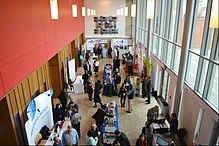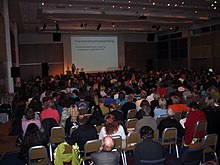Academic conference
This article needs additional citations for verification. (May 2009) |
An academic conference or scientific conference (also symposium, workshop, or meeting) is an event for researchers (not necessarily academics) to present and discuss their work. Together with academic or scientific journals and Eprint archives such as arXiv, conferences provide an important channel for exchange of information between researchers.
Overview[]

Conferences usually encompass various presentations. They tend to be short and concise, with a time span of about 10 to 30 minutes; presentations are usually followed by a discussion. The work may be bundled in written form as academic papers and published as the conference proceedings.
Usually a conference will include keynote speakers (often, scholars of some standing, but sometimes individuals from outside academia). The keynote lecture is often longer, lasting sometimes up to an hour and a half, particularly if there are several keynote speakers on a .

In addition to presentations, conferences also feature panel discussions, round tables on various issues, poster sessions and workshops. Some conferences take more interactive formats, such as the participant driven "unconference" or various conversational formats.[1]
Some academic conferences include the Artificial Intelligence International Conference, TED, Festival of Marketing, and AliensFest.[1][2]
Presentations[]

Prospective presenters are usually asked to submit a short abstract of their presentation, which will be reviewed before the presentation is accepted for the meeting. Some disciplines require presenters to submit a paper of about 6–15 pages, which is peer reviewed by members of the or referees chosen by them.
In some disciplines, such as English and other languages, it is common for presenters to read from a prepared script. In other disciplines such as the sciences, presenters usually base their talk around a visual presentation that displays key figures and research results.
Size[]
A large meeting will usually be called a conference, while a smaller is termed a workshop. They might be single track or multiple track, where the former has only one session at a time, while a multiple track meeting has several parallel sessions with speakers in separate rooms speaking at the same time.
The larger the conference, the more likely it is that academic publishing houses may set up displays. Large conferences also may have a career and job search and interview activities.
At some conferences, social or entertainment activities such as tours and receptions can be part of the program. Business meetings for learned societies or interest groups can also be part of the conference activities.
Types[]
Academic conferences typically fall into three categories:
- the themed conference, small conferences organized around a particular topic;
- the general conference, a conference with a wider focus, with sessions on a wide variety of topics. These conferences are often organized by regional, national, or international learned societies, and held annually or on some other regular basis.
- the professional conference, large conferences not limited to academics but with academically related issues.
Infrastructure[]

Increasing numbers of amplified conferences are being provided which exploit the potential of WiFi networks and mobile devices in order to enable remote participants to contribute to discussions and listen to ideas.
Advanced technology for meeting with any yet unknown person in a conference is performed by active RFID that may indicate wilfully identified and relatively located upon approach via electronic tags.
Global "round-the-clock" conferences[]
During the COVID-19 pandemics, the new format of so-called global events emerged, which "virtually travel the globe"[3] "with the sun from East to West".[3] The International Association of Constitutional Law and Alma Mater Europaea university organized the first such event in July 2020, calling it a "unique round-the-clock and round-the-globe" event featuring 52 speakers from 28 countries.[4][5]
Soon after, the round-the-globe conferences became common, some of them running for several days.[6][7][8] They became a subject of academic research.[9]
Organization[]
Conferences are usually organized either by a scientific society or by a group of researchers with a common interest. Larger meetings may be handled on behalf of the scientific society by a Professional Conference Organiser or PCO.[10]
The meeting is announced by way of a Call For Papers (CFP) or a Call For Abstracts, which is sent to prospective presenters and explains how to submit their abstracts or papers. It describes the broad theme and lists the meeting's topics and formalities such as what kind of abstract (summary) or paper has to be submitted, to whom, and by what deadline. A CFP is usually distributed using a mailing list or on specialized online services. Contributions are usually submitted using an online abstract or paper management service.
Increasingly, there has been a call for more sustainable academic conferencing, as flying to and consumption at conferences is one of the largest components of an academics environmental footprint.[11] However, few conferences have enacted practices to reduce their environmental impact, despite guidelines being widely available.[12] An analysis of academic conferences taking place in 2016, showed that only 4% of 116 conferences sampled offered carbon offset options and only 9% of these conferences implemented any form of action to their reduce environmental impact.[12]
Fraud[]
There have been accusations for fake, scam, or fraudulent conferences;[13][14] see also BIT Life Sciences and SCIgen § In conferences.
Environmental Impact[]
Academic conferences are criticized for being environmentally unfriendly, due to the amount of airplane traffic generated by them. An correspondence on Nature.com points out the "paradox of needing to fly to conferences" despite increased calls for sustainability by environmental scientists.[15]
See also[]
- Abstract management
- Academia
- Category:Academic terminology
- Academic writing
- Bullying in academia
- Congress
- Convention (meeting)
- Education
- French mathematical seminars
- Learned society
- Plenary session
- Poster session
- Proceedings
- Professional conference
- Research
- Scholarly article
- Scholarly method
- Scientific community
- Scientific method
- Scientific journal
- Seminar
References[]
- ^ Jump up to: a b See e.g. Hohl, M., & Sweeting, B. (Eds.). (2015). Composing conferences. Special issue of Constructivist Foundations, 11(1). Retrieved from http://www.univie.ac.at/constructivism/journal/11/1
- ^ "8 Inspiring Examples of Conference Websites | Ex Ordo". Blog | Ex Ordo. Retrieved 2019-02-14.
- ^ Jump up to: a b "RSA Global Webinar Series". RSA Main. Retrieved 2020-10-27.
- ^ "Oxford, Cambridge and Harvard Professors at the Alma Mater Europaea Symposium". www.sloveniatimes.com. Retrieved 2020-10-27.
- ^ "Oxford, Cambridge and Harvard Professors at the Alma Mater Europaea symposium". en.almamater.si. Retrieved 2020-10-27.
- ^ "Richard Albert--Global Summit". Menu. Archived from the original on November 16, 2020. Retrieved 2020-10-28.
- ^ "2020 Economic Science Association Global Online Around-the-Clock Meetings".
- ^ "The 2020 Around-the-Clock Around-the-Globe Magnetics Conference". ieeemagnetics.org. Retrieved 2021-04-12.
- ^ Parncutt, Richard; Meyer-Kahlen, Nils; Sattmann, Sabrina (2019-12-20). Iles, Alastair (ed.). "Live-streaming at international academic conferences: Technical and organizational options for single- and multiple-location formats". Elementa: Science of the Anthropocene. 7 (54). doi:10.1525/elementa.392. ISSN 2325-1026.
- ^ Rogers, Tony (2003). Conferences and Conventions: a global industry by Tony Rogers. ISBN 9780750657471. Retrieved 2012-07-13.
- ^ Grémillet, David (2008-10-30). "Paradox of flying to meetings to protect the environment". Nature. 455 (7217): 1175–6. doi:10.1038/4551175a. ISSN 0028-0836. PMID 18971997.
- ^ Jump up to: a b Holden, Matthew H.; Butt, Nathalie; Chauvenet, Alienor; Plein, Michaela; Stringer, Martin; Chadès, Iadine (2017-08-07). "Academic conferences urgently need environmental policies" (PDF). Nature Ecology & Evolution. 1 (9): 1211–1212. doi:10.1038/s41559-017-0296-2. ISSN 2397-334X. PMID 29046545. S2CID 205564331.
- ^ Cybercrime: The Psychology of Online Offenders
- ^ Rymer, J (1998). "Fraud. Fraud at conferences needs to be addressed". BMJ. 317 (7172): 1591. doi:10.1136/bmj.317.7172.1590. PMC 1114400. PMID 9890770.
- ^ Holden, Matthew H.; Butt, Nathalie; Chauvenet, Alienor; Plein, Michaela; Stringer, Martin; Chadès, Iadine (7 August 2017). "Academic conferences urgently need environmental policies". Nature Ecology & Evolution. 1 (9): 1211–1212. doi:10.1038/s41559-017-0296-2. ISSN 2397-334X.
External links[]
| Look up colloquium in Wiktionary, the free dictionary. |
- Academic conferences
